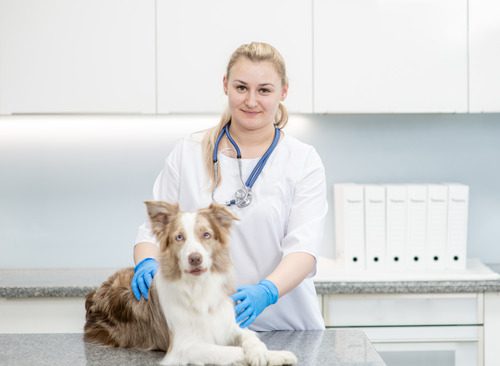My Dog is Vomiting Blood: What Do I Do?
Seeing your dog vomit blood can be a frightening experience. Whether it is a few streaks of blood or a significant amount, this symptom should never be ignored. Blood in vomit, also known as hematemesis, can indicate a variety of health issues, some of which require immediate veterinary attention. If you understand the potential causes, symptoms, and when to seek urgent care, you can help better ensure your pet’s health and well-being. If your dog is vomiting blood, contacting your veterinarian right away is the best course of action. Parrish Veterinary Clinic & Urgent Care in Parrish, FL, is here to help—call (941) 216-2335 for expert care.

What Could Cause a Dog to Vomit Blood?
There are several potential causes of blood in your dog’s vomit, ranging from mild to severe conditions. Some of the most common include:
Gastrointestinal Irritation or Ulcers
Chronic vomiting, ingestion of irritants, or certain medications (such as NSAIDs or steroids) can lead to irritation and ulceration of the stomach lining. When this happens, the stomach may start bleeding, leading to visible blood in your dog’s vomit.
Ingestion of Foreign Objects
Dogs are known for their curiosity, and sometimes they swallow items that they shouldn’t. Sharp objects, bones, or non-digestible materials can cause cuts or blockages in the digestive tract, resulting in blood appearing in vomit.
Poisoning or Toxin Ingestion
If your dog has ingested a toxic substance such as rat poison, household chemicals, or certain plants, internal bleeding can occur. In such cases, vomiting blood may be one of the first symptoms, and immediate veterinary care is essential.
Parasitic or Bacterial Infections
Intestinal parasites, such as hookworms, or bacterial infections like Helicobacter can damage the stomach lining, causing bleeding. Dogs with heavy parasite loads may exhibit additional symptoms such as weight loss, diarrhea, or lethargy.
Clotting Disorders or Bleeding Disorders
Some conditions, including hemophilia, immune-mediated diseases, or exposure to anticoagulant rodenticides, can prevent blood from clotting properly. If your dog has a clotting disorder, even minor injuries or irritation could lead to significant blood loss.
Severe Inflammatory Conditions
Gastrointestinal diseases like hemorrhagic gastroenteritis (HGE) or inflammatory bowel disease (IBD) can cause severe inflammation and bleeding in the stomach and intestines. Dogs with these conditions may also experience diarrhea, dehydration, and abdominal pain.
How to Identify if Your Dog Needs Emergency Care
Not all instances of blood in vomit indicate a life-threatening emergency, but knowing when to seek urgent veterinary care is crucial. If your dog is vomiting blood, look for these additional signs that suggest immediate medical attention is needed:
- Frequent or continuous vomiting
- Large amounts of blood in the vomit
- Weakness, lethargy, or collapse
- Pale gums, which may indicate significant blood loss
- Rapid breathing or difficulty breathing
- Signs of abdominal pain, such as whining or a hunched posture
If your dog is experiencing any of these symptoms, it is best to contact Parrish Veterinary Clinic & Urgent Care at (941) 216-2335 for immediate assistance.
Diagnostic Tests Your Veterinarian May Perform
When you bring your dog to the veterinarian for vomiting blood, our team will perform a thorough examination and may recommend diagnostic tests to determine the underlying cause. These tests may include:
Blood Tests
A complete blood count (CBC) and biochemistry panel can help identify infections, clotting disorders, organ dysfunction, or anemia due to blood loss.
Imaging (X-rays or Ultrasound)
Radiographs or ultrasound imaging can reveal abnormalities such as foreign objects, tumors, or severe inflammation in the gastrointestinal tract.
Endoscopy
In some cases, your veterinarian may use an endoscope to look inside your dog’s stomach and esophagus. This can help identify ulcers, tumors, or foreign objects that may be causing the bleeding.
Fecal Examination
A fecal test can help rule out parasites or bacterial infections that may contribute to gastrointestinal irritation and bleeding.
Potential Treatment Options for a Dog Vomiting Blood
Treatment will depend on the underlying cause of the bleeding, but may include:
- Fluids and Electrolyte Therapy: If your dog is dehydrated from vomiting, intravenous (IV) fluids can help restore hydration and electrolyte balance.
- Medications: Your veterinarian may prescribe medications such as anti-nausea drugs, acid reducers (proton pump inhibitors or H2 blockers), or antibiotics if an infection is suspected.
- Surgery: If a foreign object is causing internal damage or a blockage, surgical intervention may be necessary to remove it.
- Dietary Management: Some dogs may benefit from a temporary bland diet to help soothe the stomach and reduce irritation.
- Blood Transfusion: If your dog has lost a significant amount of blood, a transfusion may be required to stabilize their condition.
How to Reduce the Risk of Your Dog Vomiting Blood
While not all cases of vomiting blood can be prevented, there are several steps you can take to reduce your dog’s risk:
- Avoid giving human medications to your dog without veterinary approval, as some can cause severe stomach irritation.
- Monitor what your dog eats and prevent access to bones, sharp objects, or toxic substances.
- Keep up with parasite prevention to reduce the risk of intestinal infections that can cause bleeding.
- Schedule regular veterinary checkups to catch potential health issues early.
- Provide a well-balanced diet that supports gastrointestinal health and reduces the risk of irritation or ulcers.
When to Contact Your Veterinarian at Parrish Veterinary Clinic
If your dog is vomiting blood, it is always best to consult a veterinarian as soon as possible. Even if the cause appears mild, professional evaluation is essential to rule out life-threatening conditions. Parrish Veterinary Clinic & Urgent Care in Parrish, FL, can provide expert care for your pet. Call (941) 216-2335 for immediate assistance and peace of mind.
